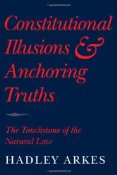
Constitutional Illusions & Anchoring Truths by Hadley Arkes
 This reviewer must admit that when reading the testimonial on the back cover describing this book as “a page-turner on classic constitutional cases†I thought it was promotional excess. Boy, was I wrong!
This reviewer must admit that when reading the testimonial on the back cover describing this book as “a page-turner on classic constitutional cases†I thought it was promotional excess. Boy, was I wrong!
Hadley Arkes is a masterful prose stylist who keeps readers enthralled from first page to last. With inexorable logic and fine edged humor he leads the way through the puzzles of constitutional law. For anyone with even a meager interest in his topic, Constitutional Illusions is indeed a “page-turner.â€
He discusses cases and challenges doctrines that are accepted both in law and in popular understanding. With encyclopedic knowledge and meticulous reasoning he demonstrates how the application of natural law would have, and should have changed some decisions.
Arkes writes about the spirit and the letter of the law and cautions about forgetting the former in overly zealous efforts to enforce the latter. His point being that the law as posited cannot possibly cover all the possible circumstances of its administration. It is therefore necessary to look beyond the law as written for guidance in “the deeper principles of justice or moral understanding†from which the law is derived. As does James W. Ceaser in Designing a Polity (reviewed here), Arkes sees the need to trace judgments back to “the first principles of our moral judgment.â€
As we make that move to the ground of our judgments, we find ourselves moving back to those deeper principles that informed and guided the judgment of the Founders as they went about the task of framing the Constitution.
He uses the case of Virginia v. Black (2003), among others, to demonstrate what happens when the Court loses sight of first principles or jurists’ grasp of moral reasoning is weak. In the Virginia case, young people burned a cross in the backyard of a black family newly moved to Virginia Beach and in a companion case, a cross was burned at an outdoor meeting of the Ku Klux Klan in Carroll County. A Virginia statute barred the burning of crosses “with intent to intimidate a person or group of persons.â€Â The Supreme Court of Virginia had interpreted the statute to mean that even with no evidence of intent to intimidate, burning a cross alone is sufficient for arrest and prosecution. As Arkes points out, for fifty years of history the burning of crosses has been understood as an assault against black people.
 However, Justice O’Connor, writing for her colleagues, over turned the conviction of Barry Black (leading the Klan meeting) because “Cross burnings have appeared in movies such as Mississippi Burning, and in plays such as the stage adaptation of Sir Walter Scott’s The Lady of the Lake.â€
However, Justice O’Connor, writing for her colleagues, over turned the conviction of Barry Black (leading the Klan meeting) because “Cross burnings have appeared in movies such as Mississippi Burning, and in plays such as the stage adaptation of Sir Walter Scott’s The Lady of the Lake.â€
Arkes comments, “But with that move of seeming open mindedness to the world, the Justice detached herself from the moral reasoning that must ever be a part of the common sense that is incorporated in statutes…â€
When a statute bars the burning of crosses, targeted at a class of persons, no one with a modicum of wit could suppose that the statute was doing anything but condemning and forbidding. What it figured to forbid were wrongful acts, acts animated by the intention of assaulting or intimidating. And no one could have supposed for a moment that the statute meant to forbid, say, the burning of crosses in a theatrical production or a film such as Mississippi Burning.Â
The author goes on to point out that the legislators who wrote the law were not acting in a random way, without moral common sense, when they passed the law. As this example illustrates, Arkes does not hesitate to speak plainly when Court renderings are detached from moral reasoning.
Arkes discusses constitutional first principles, their applications to new circumstances, and the deleterious results when they are ignored or turned aside. He rejects those who propose “a living Constitution†and uses the case of Home Building & Loan Association v. Blaisdell, 290 U.S. 398 (1934), and others, to demonstrate why.
Article 1, Section 10, of the Constitution provides that no laws should be passed “impairing the Obligation of Contracts.†To mitigate hardships suffered by depression era famers the state of Minnesota put a moratorium on mortgage foreclosures. The  United States Supreme Court held that Minnesota‘s suspension of creditor‘s remedies was not in violation of the United States Constitution.
… A majority of the Court was prepared to believe that this command, in the Constitution, could not be so unequivocal, or so indifferent to circumstances. The judges thought, in fine, that the Constitution could bear a certain degree of tinkering, or a slight impairment of the obligation of a contract, for the sake of the public benefit.
Arkes points out that a Constitution so adaptable that its literal provisions could be turned into contrarieties for the sake of accommodating the politics of the day would “make a nullity of the very notion of an ‘obligation of contract.’â€
Justice George Sutherland, writing the dissent, summarized the case for abiding by the Framers’ intent:
A candid consideration of the history and circumstances which led [to the Contracts Clause] will demonstrate conclusively that it was framed and adopted with the specific and studied purpose of preventing legislation designed to relieve debtors especially in time of financial stress.
Arkes writes,
If the obligations of a contract can be suspended or dissolved at any moment by the legislature,  “… no contract would be made with the sense that there was an obligation attached to its terms…To put it another way, there would no longer be the kinds of ‘contracts’ that the Constitution was meant to protect. In this manner, the Constitution would be emptied of its meaning in the course of interpreting or ‘adapting’ the document.’
(Please refer to A Truly Ugly Precedent for more on this case.)
Arkes disquisition on natural law as the basis of our founding documents is worth far more than the price of the book. Referencing Aristotle, Kant, and Alexander Hamilton (Federalist 31) to mention a few worthies, he posits that the very idea of law springs from the notion that we are rational beings, moral agents in our ability to make choices. It is that capacity to understand “the laws of nature and reason†that a human being “carries, ever, within himself. He is as he is, never detached from the natural law.â€
With obvious relish, Arkes exposes the logical contradictions of relativism’s claims that there are no moral truths “but it is worth noting yet again that the people who take this line nevertheless keep casting moral judgments across cultures: They condemn genocide in Darfur, as they condemned a regime of apartheid in the old South Africa, and they seem able to discern ‘wrongs’ done to women. In fact, they seem to be able to recognize women when they see them, even in exotic and primitive places. And so, in the world of the postmodernists now on the campuses, there are human rights to be vindicated all over the globe, but strictly speaking there are no humans. For there is no human nature. And since there are no moral truths, there are no human ‘rights’ that are truly rightful.â€
This reviewer sincerely hopes that these examples will elicit curiosity and engender the desire to read Arkes book. Constitutional Illusions and Anchoring Truths is as advertized, as thought-provoking as it is engrossing. Readers, however, are forewarned that while they will be greatly rewarded by what they learn, they also may be dismayed to find that those whose task it is to find the way to justice are sometimes in need of a moral compass.
 The posts are coming!
The posts are coming!

0 comments
Kick things off by filling out the form below.
Leave a Comment